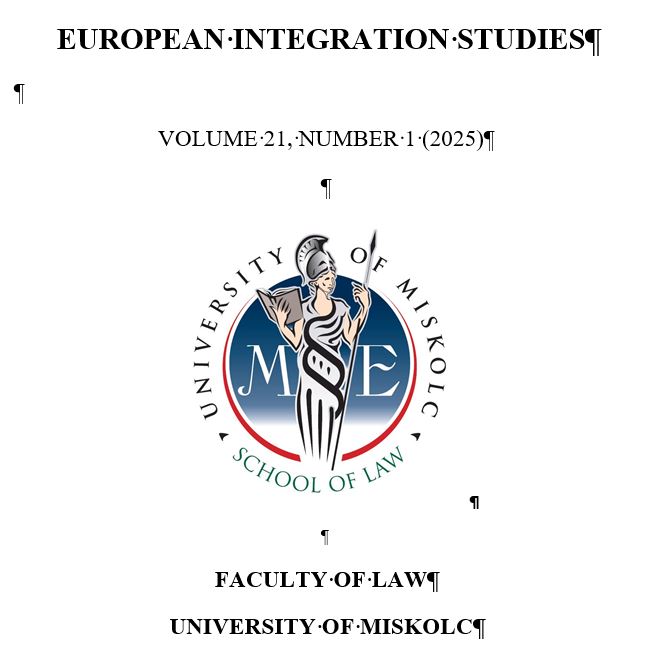The Creative Use of Non-Specific Legal Provisions Regarding Assisted Reproduction in Romania
DOI:
https://doi.org/10.46941/2025.1.3Kulcsszavak:
family, fertility, parents, children, medically assisted reproduction.Absztrakt
Romania, like any other contemporary high-income society, has its share of fertility and demographic problems. The last several decades have seen a resurgence in both medically assisted reproduction techniques and the societal demand for solutions to fertility issues. The statutes currently in force have not kept pace with technical evolutions and, due to both political and technical reasons, there is currently no comprehensive and targeted statute concerning medically assisted reproduction. However, society at large and the fertility services market have not been kept back by this lack of specific statutory provisions. General, non-specific or tangentially relevant normative provisions have been brought to the fore to construct a patchwork statutory environment for the needs of medically assisted reproduction providers and beneficiaries.
This patchwork approach is not without its drawbacks, and we will try to identify the gaps and unanswered legal questions that arise at each step using a black-letter approach to applicable Romanian law up to October 2024. A future statute on assisted reproduction should cover at least the areas of parental eligibility, informed consent, allowed and banned techniques, liability, parental filiation and confidentiality.
Hivatkozások
Avram, M. (2022) Drept civil. Familia. Third edition, Bucharest: Hamangiu Editions.
Brodeala, E. (2016) ‘The Legal Status of Assisted Human Reproduction in Romania. A Brief Discussion on Surrogacy’, Romanian Journal of Comparative Law, 7(1), pp. 56-74
Chelaru, E. (2021) ‘Art. 61. Garantarea drepturilor inerente ființei umane’ in Baias, F. A., Chelaru, E., Constantinovici, R., Macovei, I. (eds.) Codul civil – Comentariu pe articole, Third Edition, Bucharest: C.H. Beck Editions, pp. 77-78.
Diaconescu, Ș., Vasilescu, P. (2022) Introducere în dreptul civil.Volume 1. Bucharest: Hamangiu Editions.
Dobozi, V. (2013) ‘Les methodes modernes de procreation et leur influence sur le Code civil’, Studia Universitatis Babes-Bolyai – Iurisprudentia, 2013/2, pp. 59-71
Florian, E. (2018) ‘Filiația: între obsesia adevărului biologc și mistificare legală’, Revista Română de Drept Privat, 2018/3, pp. 117-129.
Florian, E. (2021) ‘Art. 441. Regimul filiației’ in Baias, F. A., Chelaru, E., Constantinovici, R., Macovei, I. (eds.) Codul civil – Comentariu pe articole, Third Edition, Bucharest: C.H. Beck Editions, pp. 594-595.
Florian, E. (2022) Dreptul familiei – Căsătoria. Regimuri matrioniale. Filiația, Eighth edition, Bucharest: C.H. Beck Editions.
Hageanu, C.C. (2023) Dreptul familiei, Third edition, Bucharest: Hamangiu Editions.
Iordăchescu, D. (2020) ‘Rolul intervențiilor psihologice în tratamentul fertilității’, Revista de psihologie, 66(2), pp. 167-177.
Irinescu, L. (2014) ‘O nouă perspectivă asupra filiației: reproducerea umană asistată medical cu terț donator’, Analele științifice ale Universității „Al. I. Cuza” Iași, Tomul LX Științe juridice, No. I, pp. 15-22.
Irinescu, L. (2019) ‘Copilul, un dar sau un drept?‘, Revista de Dreptul Familiei, 2019/1-2, pp. 208-218.
Macovei, I. (2017) Tratat de drept international privat. Bucharest: Universul Juridic Editions.
Motica, A. R. (2021) Dreptul civil al familiei – Raporturile nepatrimoniale. Curs teoretic și practice. Third edition. Bucharest: Universul Juridic Editions.
Neagu, A. (2023) Infertilitatea în mediul urban din România, [Online]. Available at: https://www.hotnews.ro/stiri-sanatate-26126822-infertilitatea-mediul-urban-din-romania-4-din-10-cupluri-nu-reusesc-obtina-sarcina-desi-incearca-acest-lucru-1-5-ani-una-din-4-sarcini-obtinuta-urma-unui-tratament.htm (Accessed: 25 June 2023).
Neamț, I. I. (2022) ‘Reproducerea asistată medical: adevăr sau provocare’ in Popescu, D. A., Golub, S. (eds.) O familie pentru Europa, o Europă a familiilor?, Bucharest: Hamangiu Editions, pp. 630-681.
Nicolescu, C. (2021) Ocultarea adevărului biologic – vector al principiului interesului superior al copilului? Despre ficțiuni juridice în materia filiației in Almășan, A., Vârsta, I., Zamșa, C. E. (eds.) In honorem Flavius Antoniu Baias. Volume III. Bucharest: Hamangiu Edition, pp. 681-696.
Nicolescu, C. (2023) Dreptul familiei, Second edition, Bucharest: Solomon Editions.
Popescu, D. A., Oprea E. A. (2023) Drept internațional privat. Bucharest: Hamangiu Editions.
Predescu, N. -R. (2020) ‘Solutii Legislative si Practici Judiciare in Materia Reproducerii Asistate Medical cu Mama Surogat’, Curierul Judiciar, 2020/8, pp. 476-481.
Predescu, N.-R. (2022) Reproducerea asistată medical. Bucharest: Universul Juridic Editions.
Tec, L. (2017) ‘Soarta embrionilor umani congelați – nouă provocare pentru Drept’, Revista Română de Drept Privat, 2017/4, pp. 234-250.
Tec., L. (2019) Gestația pentru altul, din nou, sub lupa Curții Europene a Drepturilor Omului, juridice.ro, [Online]. Available at https://www.juridice.ro/635823/gestatia-pentru-altul-din-nou-sub-lupa-curtii-europene-a-drepturilor-omului.html (Accessed: 19 October 2024).
Vlădăreanu, R., Onofriescu, M. (2019) Ghid de bună practică în fertilitate, Societatea de Obstetrică şi Ginecologie din România şi Colegiul Medicilor din România, [Online]. Available at: https://sogr.ro/wp-content/uploads/2019/06/34.-Ghid-de-bun%C4%83-practic%C4%83-%C3%AEn-infertilitate.pdf (Accessed: 25 June 2023).
European Court of Human Rights (2012) Research Report – Bioetics and the case-law of the Court, pp. 44-45, [Online]. Available at: https://rm.coe.int/bioethics-and-caselaw-court-en/1680a90ccb (Accessed: 18 October 2024).





